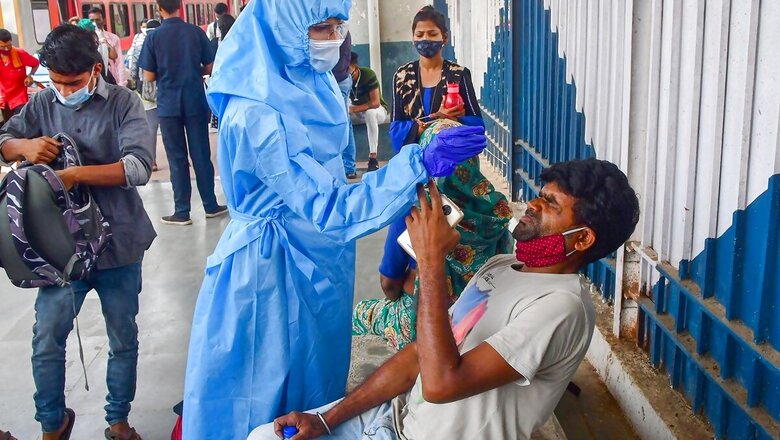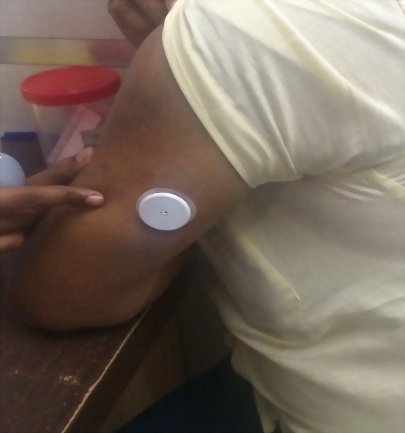
views
The COVID-19 pandemic has turned the world upside down. It has been repeatedly seen that people with co-morbidities like older age, diabetes, hypertension and cardiovascular and respiratory disease tend to fare badly if they get infected by the virus, SARS-CoV-2.
In this article, I will answer some frequently asked questions on diabetes and COVID-19.
Are people with diabetes more likely to suffer poorer outcomes if they test positive for COVID-19?
This is true to some extent. However, to be clear, this is applicable only to those with uncontrolled diabetes. Hundreds of diabetic patients have developed COVID-19, but majority of them have done well and recovered without any side-effects. Unfortunately, we have lost some people with diabetes to COVID-19, although their number is small. Analysis of these patients’ records have shown that historically they had poor control over diabetes with glycated hemoglobin levels above 9 per cent (below 7 per cent is considered good control) and were not regular with their treatment.
Why do people with uncontrolled diabetes do badly if they test positive for COVID-19?
When the novel SARS-CoV-2 virus enters the body, the body’s defense mechanism (immunity) usually takes care of the virus. There are two types of immunity—innate immunity and acquired immunity. The former comes into play as soon as the virus enters the body. Subsequently acquired immunity, which is like a second line of defence, kicks in. As long as the immune mechanism is fine, people will recover from COVID-19, just like they do after a common cold or flu. However, if their immunity is weak, the virus then aggressively invades the body and triggers a hyper-inflammatory response called ‘cytokine storm’. This is characterized by the secretion of toxic substances, which can damage various organs including the heart, blood vessels, lung, liver or kidney. People with uncontrolled diabetes have a greater chance of developing cytokine storm.
What precautions should people take if they have diabetes?
First and foremost, they should keep their blood-sugar level under control. They should increase the frequency of blood sugar testing and keep both fasting and after-food sugar levels under control. Today, with the availability of small coin-shaped sensors, which can be placed on the arm, (see pic) people can continuously monitor their glucose level and calculate their ‘Time in Range’ (TIR). If the TIR is more than 70 per cent, risk of developing complications is less.

A small coin-shaped sensor that can monitor glucose level
People with diabetes should also follow a healthy diet, which includes green leafy vegetables and 1-2 fruits per day. They should, however, limit their carbohydrate intake (rice or wheat). They should also exercise regularly. It is essential to get 6-8 hours of good quality sleep and try and get into the bed, latest by 11 pm. Yoga, pranayama and meditation are also beneficial. All these measures help improve immunity.
What symptoms should people watch out for?
The initial symptoms of COVID-19 infection resemble that of common cold or flu. These can include fever, throat pain, body pain and fatigue. Unlike common cold, in COVID-19, it is unusual to have a running nose. When suffering from flu or cold, breathlessness (shortness of breath) is unusual. If you have this symptom, the oxygen saturation level should be checked immediately as it could indicate your lungs getting affected. If the fever is high and prolonged and/or there is breathlessness and oxygen saturation level is starting to drop, you should rush to the hospital.
What are the usual tests which can be done if somebody tests positive for COVID?
The first test to do is a CT scan to see if the lungs have been affected, and if yes, how much. There are also blood tests which can show the severity of the COVID infection, like the D-Dimer test, C-reactive protein and ferritin, among others. Once these are done, it becomes easier to decide whether or not it is a case of serious COVID infection. People with mild infections can be quarantined at home and treated. Those with severe infection have to be treated with specific drugs and, if warranted, should be hospitalized.
Are there any particular anti-diabetic drugs which are more suitable if a diabetic person contracts COVID?
If the infection is mild and blood sugar levels are well under control, you can continue with whatever medications you are currently on. However, if the symptoms are severe or if hospitalization is required, it will be necessary to switch to insulin injections. People with severe COVID are invariably given steroids. This can send their sugar levels sky rocketing. Hence, insulin is needed, at least in the short term (for a few weeks), until the steroids are stopped.
Can COVID-19 induce diabetes in somebody who was not known to have diabetes?
In many cases, we have observed an onset of diabetes in those who have had COVID-19. This can be due to several factors:
1. During the lockdown, physical activity of some people has reduced dramatically
2. Some people, because of fear and anxiety, have started binge-eating
3. Due to excessive weight gain
4. Depression and severe anxiety, which can produce ‘stress induced diabetes’
5. Steroids are known to increase the risk of diabetes
6. Finally, a recent study has shown that the SARS-CoV-2 virus is believed to penetrate the pancreas and damage the pancreatic beta cells. However, more research is needed on this.
Can COVID-19 damage other organs?
Yes. Increasingly, various specialists are reporting damage to eye, kidney, heart, blood vessels, as well as various clotting problems. All these can be minimized if one is vaccinated.
Should people with diabetes get vaccinated?
People with diabetes should actually be vaccinated first because they are at very high risk of getting infected. Which vaccine does not matter, what’s important is people take both the doses as recommended.
What extra precautions should people take, now that the second wave of COVID-19 is ravaging the country?
The basic precautions still remain the same: wearing a mask is very important (even if one has taken both shots of the vaccine). Other precautions like maintaining social distance, avoiding crowded places (unless absolutely necessary) and frequent washing of hands continue to be important.
What to be mindful of during post-COVID care?
It is now known that in a small percentage of people, who suffered from COVID-19, the symptoms and signs seem to persist for weeks or even months after they have recovered from the infection. This is known as ‘long COVID’. Symptoms can be vague and can include palpitation, tremors, weakness, facial paralysis, blood clots, and sometimes even heart attack or stroke. These complications are rare in those who have been vaccinated.
Can somebody who is vaccinated still test positive for COVID-19 and pass on the infection to others?
Yes. I have seen this in some families, where those who have been vaccinated as well as those who are yet to get vaccinated tested positive for COVID-19. However, there was a big difference. Almost everyone who was vaccinated had virtually no symptoms and their CT scans were almost normal. Conversely, those who had not been vaccinated suffered a much severe form of the disease. Hence, what vaccination does is, it protects you from severe infection and far-worse outcomes.
What is your final message to people with diabetes?
Many people with diabetes contact me and ask whether their life is in danger because of the COVID-19 pandemic. I would like to tell them that although there are close to 80 million people with diabetes in India, the number of people who have actually succumbed to the disease is miniscule. Thus, there is no need to panic. However, you should go for regular checkups with your diabetologist to keep your blood sugar levels under control.
Dr. V. Mohan is Chairman & Chief of Diabetology, Dr. Mohan’s Diabetes Specialties Centre, Chennai. For his contributions, he has been awarded the Padma Shri, Dr B.C. Roy Award, Dr B.R. Ambedkar Centenary Award, among others. His memoir, ‘Making Excellence a Habit’, is available at bookstores and online.
Read all the Latest News, Breaking News and Coronavirus News here. Follow us on Facebook, Twitter and Telegram.


















Comments
0 comment